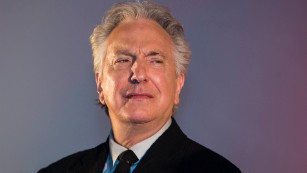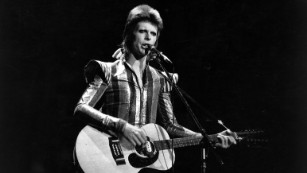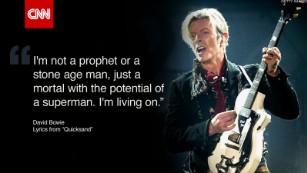He was 69.
"There are no words to express how shocked and devastated I am to hear of Alan Rickman's death," "Potter" author J.K. Rowling tweeted Thursday.
Fans had lost "a great talent," she said, and his family "have lost a part of their hearts."
Daniel Radcliffe, who played Harry Potter in the films, posted a statement on Google+ calling Rickman "one of the greatest actors I will ever work with" and one of the nicest, as well.
"Alan was extremely kind, generous, self-deprecating and funny," Radcliffe wrote. "And certain things obviously became even funnier when delivered in his unmistakable double-bass."
A smooth-voiced London native, Rickman worked on stage with the Royal Shakespeare Company and in UK television projects before earning his first film role as German terrorist Gruber, opposite Bruce Willis' John McClane, in 1988's "Die Hard."
He had been in Hollywood only two days, but he almost didn't take the role.
"I read it, and I said, 'What the hell is this? I'm not doing an action movie,' " he recounted in a 2015 interview with the British Academy of Film and Television Arts.
It ended up being one of the most memorably villainous roles in film history.
In the 2015 interview, Rickman recounted that he helped shape the role, despite being a novice film actor hired because he would work cheap.
After being fitted to wear a militaristic outfit as leader of a band of terrorists, Rickman suggested that perhaps Gruber could wear a suit, affect an American accent and pretend to be a civilian trapped in the building for a scene with Willis' cop character.
He said he was told, "You'll wear what you're told."
"But then I came back, and they handed me the new script" that included the revisions.
"So you know, it just pays to occasionally use a little bit of theater training when you're doing a movie."
Despite acclaim for his portrayal of Gruber and performances in movies such as "Robin Hood: Prince of Thieves," "Truly Madly Deeply" and "Sense and Sensibility," Rickman was never nominated for an Oscar.
He did win a BAFTA Award for supporting actor in "Robin Hood" and was nominated three other times, including for "Truly Madly Deeply," in 1990, and "Sense and Sensibility" in 1995.
He also won a Golden Globe in 1997 for best actor in the HBO biopic "Rasputin."
Although he carried on a lifelong love affair with stage acting, Rickman is probably best known to younger filmgoers as Snape, the antagonistic and bullying wizard who, in the end, plays a crucial role in the Potter saga.
He took the role in 2001's "Harry Potter and the Sorcerer's Stone" without knowing much about the character.
"People thought I knew a lot, and I didn't," he said. "When I was asked to do it, there were only three books written."
But he did have a clue, he said in a 2011 thank-you letter to Rowling at the conclusion of the film series, which saw stars Daniel Radcliffe, Emma Watson and Rupert Grint grow up on screen.
"Three children have become adults since a phone call with Jo Rowling, containing one small clue, persuaded me that there was more to Snape than an unchanging costume, and that even though only three of the books were out at that time, she held the entire massive but delicate narrative in the surest of hands."
That knowledge helped shape his portrayal of the character, he told the Los Angeles Times in 2011.
"It was a punctuation mark in my life every year, because I would be doing other things but always come back to that, and I was always aware of my place in the story even as others around me were not," Rickman told the newspaper.
His presence was invaluable, "Potter" producer David Heyman told the Los Angeles Times.
"He had a real understanding of the character, and now looking back, you can see there was always more going on there -- a look, an expression, a sentiment -- that hint at what is to come," Heyman said. "The shadow that he casts in these films is a huge one, and the emotion he conveys is immeasurable."
Acting was 'an inevitability'
Rickman was born in 1946 to a working-class West London family. Despite an early interest in acting, he studied graphic design in college and owned a design business with friends after graduating.
In 1971, at the age of 25, he applied to the Royal Academy of Dramatic Art, one of the oldest acting schools in England.
"There was an inevitability about my being an actor since about the age of 7, but there were other roads that had to be traveled first," Biography.com quoted him as saying.
In 1978, he joined the Royal Shakespeare Company, followed by roles in British television and theater.
In 1985, he won the role of Le Vicomte de Valmont in the stage version of "Les Liaisons Dangereuses," his first major villain -- and the breakthrough role for which he was nominated for a Tony Award in 1988.
Later that year, he went to Hollywood to try his hand at film acting. Despite not knowing much about the film business, he was offered the "Die Hard" role immediately.
"I'd never made a film before, but I was extremely cheap," he said in the BAFTA interview.
And despite almost rejecting "Die Hard," he said, the progressive storyline won him over.
"Every single black character in that film is positive and highly intelligent," he said. "So, 28 years ago, that's quite revolutionary, and quietly so."
Playing Gruber gave rise to the notion of Rickman as master of villainous roles, one at which he often bristled.
"I don't see them any of them as one word," Rickman said of his roles in 2011. "It doesn't matter what I'm playing, it's not one word, and I think any actor would say the same."
Not all of his roles were heavy or dark, of course. In 1999's campy "Galaxy Quest," a heavily made-up Rickman played a classically trained actor named Sir Alexander Dane. In the movie, Dane was a washed-up science-fiction actor whose character had a trademark expression, "by Grabthar's hammer!"
The exclamation was trending Thursday on Twitter in tribute to Rickman.
'A rare and unique human being'
As news of Rickman's death spread, so did the tributes.
"I'm very sad to hear about Alan today," "Harry Potter" star Emma Watson tweeted. "I feel so lucky to have worked and spent time with such a special man and actor. I'll really miss our conversations."
Jason Isaacs, who played Lucius Malfoy in the "Potter" films, tweeted, "Heartbreaking news about lovely Alan. Nobody else could be as hilarious, tragic, terrifying & truthful all at the same time."
British actor Stephen Fry called the news of Rickman's death "desperately sad."
"A man of such talent, wicked charm and stunning screen and stage presence," Fry wrote. "He'll be sorely missed."
"He was generous with his time, his insight, his money, his experience, not only to RADA students but to young actors and theatre makers across the spectrum," he said in a statement. "He will be much missed."
Actress Emma Thompson, who appeared with Rickman in "Judas Kiss," "Love Actually," "Sense and Sensibility" and three of the Harry Potter films, issued a moving statement mourning his death, according to numerous media outlets.
"Alan was my friend and so this is hard to write because I have just kissed him goodbye," she wrote.
"What I remember most in this moment of painful leave-taking is his humour, intelligence, wisdom, and kindness," Thompson said in the statement. "His capacity to fell you with a look or lift you with a word.
"He was, above all things, a rare and unique human being and we shall not see his like again," she said.
Rickman is survived by his wife, Rima Horton, whom he met when they were teenagers. The couple had no children.
His fans still have a few new things to look forward to.
His film "Eye in the Sky," about drone warfare in Kenya, is set for March release. He also did voice work for the upcoming "Alice Through the Looking Glass."


